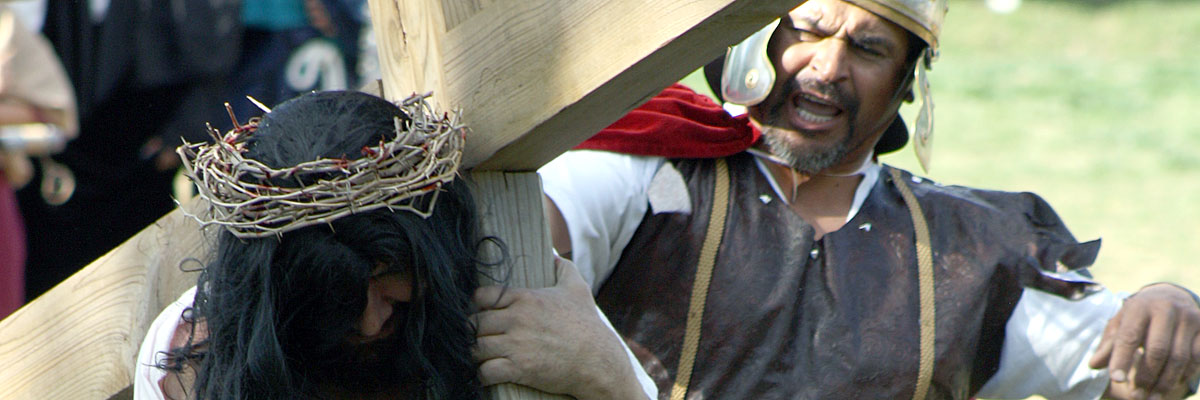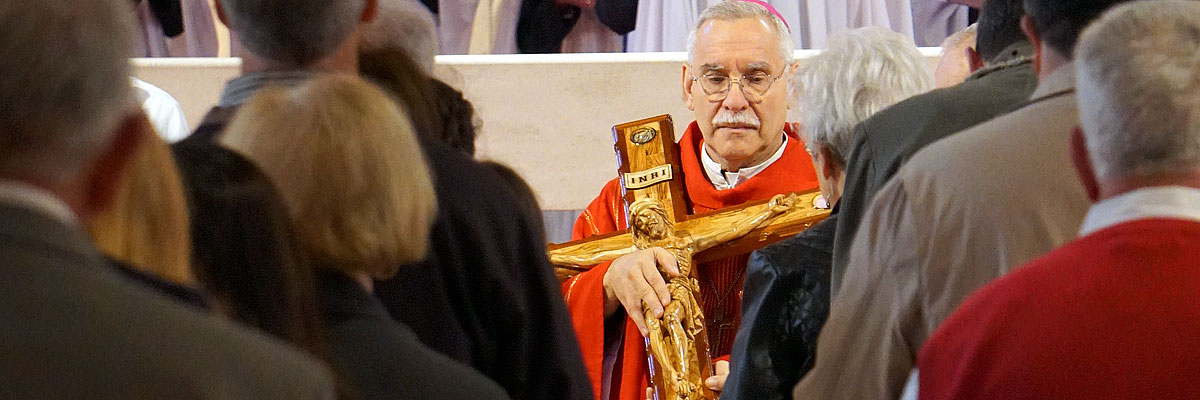Official Website of the
Catholic Diocese of Little Rock
Holy Thursday Mass of the Lord's Supper 2019
Published: April 18, 2019
Bishop Anthony B. Taylor preached the following homily at the Cathedral of St. Andrew in Little Rock on Thursday, April 18, 2019.

Bishop Taylor
About two miles west of here is the Central High School memorial site. Memorials are to help us remember, so what are we supposed to remember there? Obviously, our nation’s long struggle for civil rights and how nine courageous teenagers from Little Rock were part of a long and painful process that eventually changed our city and our nation for the better.
If you go there and view the old TV news reports from that era, you’ll experience a remembering so powerful and moving that your whole body is affected. This kind of remembering is more than simply the recollections in your brain. It’s like you’re actually there, participating in the events being remembered, reliving yourself those shameful events and the glorious struggle that changed us and our city forever.
That’s the kind of remembering that occurs on the Jewish feast of Passover. Passover doesn’t just recall liberation from slavery, it relives it. It is a liturgical time machine that transports us back to Egypt. The past becomes present, thereby making us party to the Old Covenant established by God and ratified by all the people so long ago.
Jesus took his disciples back into the past in order to fulfill that past in the present, show how the liberation God accomplished through Moses then prefigures the far greater liberation that God is accomplishing through Jesus now.
And what is true regarding Passover is even more true regarding its fulfillment at the Last Supper and at every Mass ever since. Notice that when Jesus instituted the Eucharist he didn’t say: "Do this to help you recollect." He said: "Do this in remembrance."
Remembering is not the same as recollecting. "Recollect" means to collect your thoughts again, a mental recall of past events. "Remember" by contrast, means to re-member, to become a member of, party to, participate in the past event again.
So, at the Last Supper Jesus and his disciples actually relived, became parties to the original Passover 1,200 years earlier, but this time in a way that had never been experienced before. Jesus took his disciples back into the past in order to fulfill that past in the present, show how the liberation God accomplished through Moses then prefigures the far greater liberation that God is accomplishing through Jesus now.
The lamb sacrificed then prefigured Jesus’ sacrificial death now. The blood on the doorposts then prefigures Jesus’ blood on the cross now. The flesh of the Passover lamb, the unleavened bread of the Exodus and the life-giving manna consumed by believers in the wilderness then prefigure the far more life-giving food of eternal life now: Jesus’ own body and blood consumed by believers in the wilderness of today’s world now.
The Old Covenant sealed by the blood of bulls at Mount Sinai prefigures the far greater New Covenant about to be sealed by Jesus’ blood on Mount Calvary. Their crossing the Red Sea three days after departing Egypt prefigured Jesus resurrection three days after departing this life.
Their entry into the Promised Land of Israel 40 years later prefigures Jesus’ Ascension into the Promised Land of heaven 40 days later. And at every Mass we don’t just recall these marvelous events of our salvation, we "re-member" them; relive them, become party to them once again.
And there’s more: In the Eucharist, not only do we become present to past events as at Passover, we also become present to the author of those events, unlike Passover, where the matza and wine remain bread and wine.
It is only in the Eucharist that the author of salvation, Jesus, becomes really present to us in his very Body and Blood, which he then unites to our own in Communion (union with) him, "re-members" us (makes us members of) the Body of Christ as we re-member him and then join him in offering to the Father in sacrifice for our salvation, his and our body and blood, his and our whole self. ... which have now become one sacramentally, one with Jesus and with everyone else with whom we are now in communion — making us party to the New Covenant established by God through Jesus and embraced by all believers — including now also us, today.







